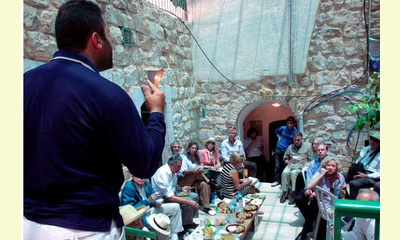|
|
Despite crackdown, Palestinians organize for long-term peace
un article par Waging Nonviolence. It appears here courtesy of a Creative Commons license.
Conflict has erupted in Israel and Palestine after the discovery of the
bodies of three Israeli teenagers early last week, whom the
Israelis say were kidnapped by Hamas. The Western media, for its
part, has focused on the street battles between young Palestinians
and the Israeli military, rushing to print photos of young Palestinian
men throwing rocks and of masked Hamas militants armed at a
press conference. However, these images are far from the
whole story. On the ground Palestinian groups are acting to
turn this rage into long-lasting nonviolent organizing.

Issa Amro from Youth Against the Settlements speaking in Hebron in 2012 (Flickr/jstreetdotorg)
click on photo to enlarge
Last week, the Israeli military sent tanks and troop reinforcements
to the border between Israel and the Gaza strip and began heavy
airstrikes that have killed at least seven Palestinians — the most
recent development in the crackdown on Palestinian life that
followed the disappearance of three settler teenagers approximately
two weeks ago. Even before the bodies of the teens were found
last Monday evening, Israeli had launched a large-scale incursion
into West Bank cities, raiding some 2,200 homes, arresting 419
Palestinians and killing at least six.
The discovery of the boys’ bodies, elicited sorrow, fury and — for
some Israelis — a desire for revenge. Tuesday evening, crowds of
Israelis chanted “death to Arabs” as they stormed through the
streets of Jerusalem. The next morning, the body of 16-year-
old Palestinian Mohammed Abu Khaider, who had been seen being
forced into a car the night before, was found in a forest. In many
ways, the violence and loss is unsurprising for Palestinians: It is,
after all, an everyday reality here. But the intensity of the raids,
scale of arrests, and very visible increase in threatened and actual
violence from right-wing Israelis means the situation now feels
different. For those working in the resistance movements, these are
challenging and uneasy times. But they are also far from hopeless.
Jamal Juma, the coordinator of Stop the Wall, a coalition of
Palestinian organizations, has experienced crises like these before.
“Stop the Wall started in 2002, in a very difficult and bloody
situation,” he said. “We had massacres all over Palestine. But,
despite that, we started organizing people in popular resistance.”
“At the moment,” he continued, “we are experiencing very brutal
invasions, which remind us of the invasions that happened in 2002.
They are sending a strong message to Palestinians: that nothing will
be tolerated.”
The response in the streets, Juma maintains, has largely been
neither obedient nor violent, but careful: marches and protests
rather than “people shooting each other.” When the Israeli army
launched Operation Brother’s Keeper last week in Hebron, groups
like Youth Against Settlements mobilized by supporting families
whose homes had been raided with calls and solidarity visits —
essential practical support in the context of enormous isolation and
fear.
Next week, beginning on July 9, the Stop the Wall coalition will
launch what it hopes will be a broader and more unifying campaign.
Scheduled to begin on the anniversary of the International Criminal
Court’s decision on the illegality of the separation wall, the
campaign will focus on two areas. In Hebron, a city fractured and
closed off by Israeli settlements, the aim is explicitly to “lift the
siege” through a burst of nonviolent demonstrations. In the Jordan
Valley, where full Israeli control and settlement activity mean home
demolitions are a constant threat, Palestinians plan to launch the
Popular Council to Save the Jordan Valley, which seeks to unite the
work of activists working across the region to document violations,
coordinate resistance and support in the case of resistance, and
mobilize media coverage.
[Thank you to Janet Hudgins, the CPNN reporter for this article.]
(This article is continued in the discussionboard)
|








|
DISCUSSION
Question(s) liée(s) à cet article:
How are the Palestinians responding to the latest attacks?,
* * * * *
Commentaire le plus récent:
CPNN has received the following Statement from the National Coalition of
Christian Organizations in Palestine on the situation: Support Gaza’s Right to Life
“Justice and security are two sides of the same coin. Israel’s security can never be an excuse for denying justice to the Palestinian people.”
In the spirit of the living God who sanctifies all life and in keeping with our faith and its teachings we appeal to all people across the world to work with their fellow citizens and governments to end Israel’s Operation Protective Edge and the brutal military siege that has been going on for the past seven years which includes a naval and economic blockade. Gaza has no port or airport thus no way to import or export its products.
This not a war. This is only vengeance and collective punishment. A responsible authority works to stop useless vengeance and violence. Instead, it fosters general atmosphere of incitement, in order to please a Palestinian hating population, and not knowing what to do, the irresponsible Israeli Authority, just kills Palestinians and demolishes their houses, in order to please their people. We acknowledge the voice and action of the few Israelis who expressed themselves against this policy of their government.
This is not an escalation or a war. Gaza has no military or ability to protect itself other than to fire some homemade rockets. . ... continuation.

|
|









